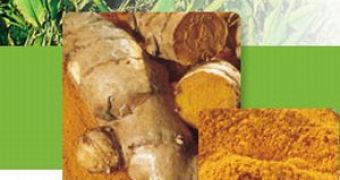A recent study conducted by scientists at the University of Texas Medical Branch at Galveston (UTMB) showed that the curcumin pigment in the curry spice prevents colorectal cancer. Numerous previous studies have already acknowledged the beneficial properties of the natural pigment against a wide range of cancers, including colorectal one. But the current study is based on curcumin's potency to block the neurotensin gastrointestinal hormone, which is closely connected to the production within our bodies of an inflammatory protein which plays a key-role in the growth and proliferation of cancer cells.
The study carried out by UTMB researchers is entitled 'Curcumin inhibits neurotensin-mediated interleukin-8 production and migration of HCT116 human colon cancer cells'. The team stated they hope that further studies on the idea of the current research will develop new strategies of fighting against colorectal cancer, by using curcumin to inhibit the production of the neurotensin hormone.
Mark Evers, senior author of the study and director of UTMB's Sealy Center for Cancer Cell Biology pointed out: "Our findings suggest that curcumin may be useful for colon cancer treatment, as well as potential colon cancer suppression, in cells that respond to this gastrointestinal hormone, neurotensin. About a third of all colorectal cancer cells have the receptor for neurotensin." He also explained: "We found that in colon cancer cells, neurotensin increases not just the rate of growth but also other critical things, including cell migration and metastasis. The fact that all that can be turned off by this natural product, curcumin, was really remarkable."
Curcumin is the yellow pigment found in the curry spice turmeric. Turmeric is commonly known as one of the cheapest spices, that has been used since antiquity as a condiment and also as dye. Originating in South East Asia, the turmeric contains curcuminoids that are the most beneficial ingredients of this plant. Previous researches found that curcuminoids have antioxidant, antibacterial and anti-inflammatory effects upon human body.
Also, the turmeric intake helps supporting the health of the liver, prevents high doses of cholesterol in our organism and is being studied by scientists for its tumor-blocking ability. As an anti-cancer agent, turmeric has been found to block the uncontrollable growth of melanoma tumor cells, cells that lead to breast and colon cancer, leukemia etc.

 14 DAY TRIAL //
14 DAY TRIAL //